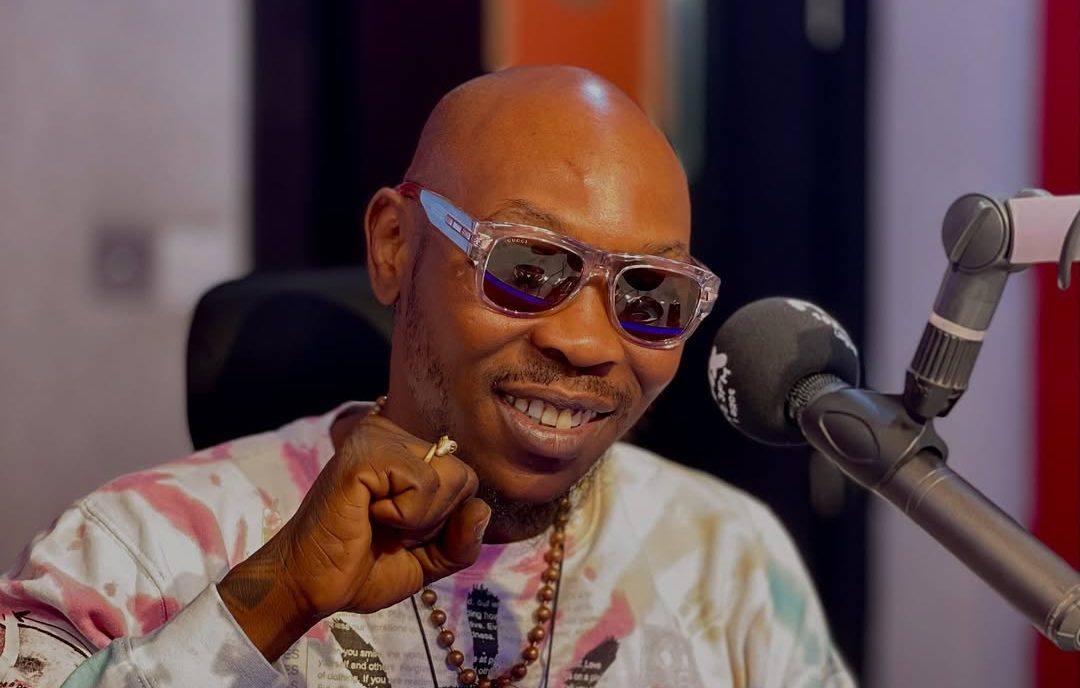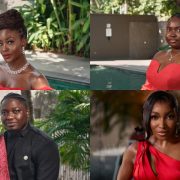“There’s always an African side to the story or the solution to the problem that has not been considered”. – Seun Kuti
By Emmanuel ‘Waziri’ Okoro
African music, celebrated today for its global dominance, has always been underpinned by the work of revolutionaries. Long before the social media virality or the Afrobeats-to-the-world movement, there were artistes who wielded sound as a weapon, a mirror, and a rallying cry. Fela Anikulapo Kuti, the father of Afrobeat and a key progenitor of modern-day Afrobeats, have embodied this fusion like no other. Fela’s life and work were dedicated to challenging societal norms and speaking truth to power.
In that same spirit, his youngest son, Seun Kuti, has refused to dilute the fire he inherited. For Seun, music is wielded as a tool for liberation and an extension of a lifelong revolutionary and socio-political education. His sound carries the sharpness of social commentary, the discipline of jazz, and the urgency of protest, while still opening up pathways for collaboration.
This year alone, he has expanded that mission through multiple creative projects. He released Heavier Yet (Lays The Crownless Head) Deluxe, a charged, contemplative album featuring some of the finest musicians across the diaspora. He followed that with BIGBIRD & THA VIPER, a joint EP with rapper, Vector, built on irreverence and a shared instinct for social truth-telling. Most recently, he partnered with contemporary Pan-Africanist, Diallo Kenyatta, for Bird’s Eye View, a new podcast on Okay Africa that dissects African realities with sharp political analysis and unfiltered humour.
In this interview with Afrocritik, Seun Kuti delves deep into the podcast, his approach to revolutionary work, legacy, and much more.
*This interview has been edited for length and clarity.
You’ve always been one to say the truth as it is without fear or favour. What inspired the decision to do so in a cohesive, structured manner in Bird’s Eyes View podcast?
Well, I think my analysis and critique of society have always come from a very structured and well-researched place. Even though there’s a certain narrative out there that tries to frame what I say as emotional outbursts or ‘rants’, that has never been the truth. I pride myself on the fact that nothing I put out can be dismissed as false or malicious. My commentary has always been rooted in constructive criticism, pointing out not just what is wrong, but what we should be doing instead.
So with Bird’s Eye View, doing this with Diallo is simply an extension of that. It’s another vehicle for the same message, but in a format people consume more readily today. I see myself as someone doing liberation work, and when you approach your life from that standpoint, it’s not about how successful you are in one particular field, whether music, activism, or whatever. It becomes about asking: How can I use my gifts, in any medium, to advance this work?
This podcast is just one more way to project those ideas, to reach African people everywhere, and to continue the mission through whichever platforms allow the message to travel furthest.
One noticeable aspect about the podcast is that as co-hosts, you and Bro Diallo blend humour while discussing the gravity in each topic. Was it intentional to use humour as a way to make these conversations accessible and digestible to younger or less politically-engaged audiences?
Well, for Diallo and me, it was important that the podcast carried our essence; not just our politics, but our genuine relationship as brothers, comrades, revolutionary collaborators, and friends. In many ways, we’re family. My relationship with Diallo runs very deep. His wife is like family to me, he knows my daughter personally, and his sons are like my sons. So, when we decided to do this podcast, we wanted that bond, that familiarity, that natural rhythm between us to be part of the experience.
We genuinely enjoy each other’s company. And when we’re together privately, we laugh, we joke, we analyse, we debate. But even in the humour, there’s always a message. We realised that a lot of the things we do when we’re alone, even the funny bits, actually carry powerful insights. So we thought: why not bring that into the show? Why hide it?
That’s how elements like the “Holy Ghost dance” came in. It’s something we say when people are jubilating over nonsense, celebrating things that don’t serve them or their communities. And we felt that incorporating these moments would resonate with people on a basic, human level. Because humour can open the door for deeper reflection.
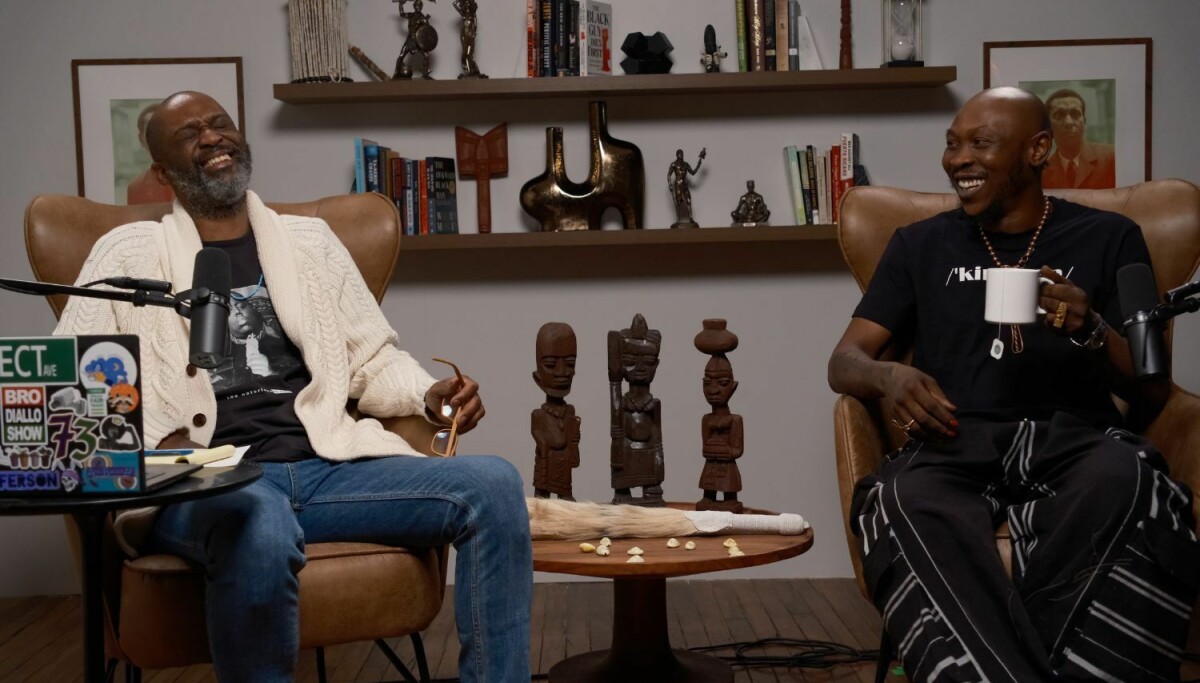
Your co-host, Bro Diallo, brings a distinctive African American lens to the pod. How has collaborating with him shaped or challenged your own perspectives as an African living on the continent?
There’s no challenge. What we have is really a resolving of contradictions. My relationship with Diallo, to me, is a projection, a representation of what a healthy relationship between an African on the continent and an African in America can actually look like. Because right now, there’s a very loud narrative trying to divide us as African people.
In the US, you have these two major movements: FBA, that’s Foundational Black Americans, and ADOS [American Descendants of Slavery] that push a lot of anti-African rhetoric. They tell African Americans to separate from Africa entirely. And on the other side, you also find Africans in America who look down on African Americans, saying things like, They don’t have culture, They’re this, They’re that, repeating the nonsense they’ve heard in oyibo films about their own cousins.
So, when Diallo and I work together, when we sit down to analyse issues, it becomes a way of countering that division. Our conversations are intentional; they break down those false narratives that are being sponsored by the enemies of our people. Instead of accepting the separation that the white man has drawn up for us, we try to show what unity looks like, what solidarity looks like.
You and Bro Diallo have covered topics ranging from the ‘First Blacks’ conundrum, how to catch a Pan-African scammer, conquest and justice, and the cult of capitalism. What’s your process for choosing topics for each episode? How do you bounce ideas?
Why are you doing like this? Because, from what I understand, you’ve clearly seen on the podcast that we consult the gods. The gods reveal our topics to me, and we simply speak as the spirit directs. It’s not as though we sit down in long meetings with the team, deliberate for hours, outline points, gather research, cross-check sources, and marshal arguments. It’s not as if we have a whole dedicated team of researchers backing everything up. Big up Bianca, big up Kobe, big up Travis – not that all these people exist in the background doing serious work. Oga, why are you laughing?
On the show, you see it clearly: I consult. Because some of you want to downgrade African gods, as if they don’t have power. You see me, right there on set, communicating, and the gods revealing the topics to us spontaneously. And you’re here asking this kind of question? (laughs). My brother, behave yourself, before you receive an e-fight. Have you been electronically fought before? Spiritually?
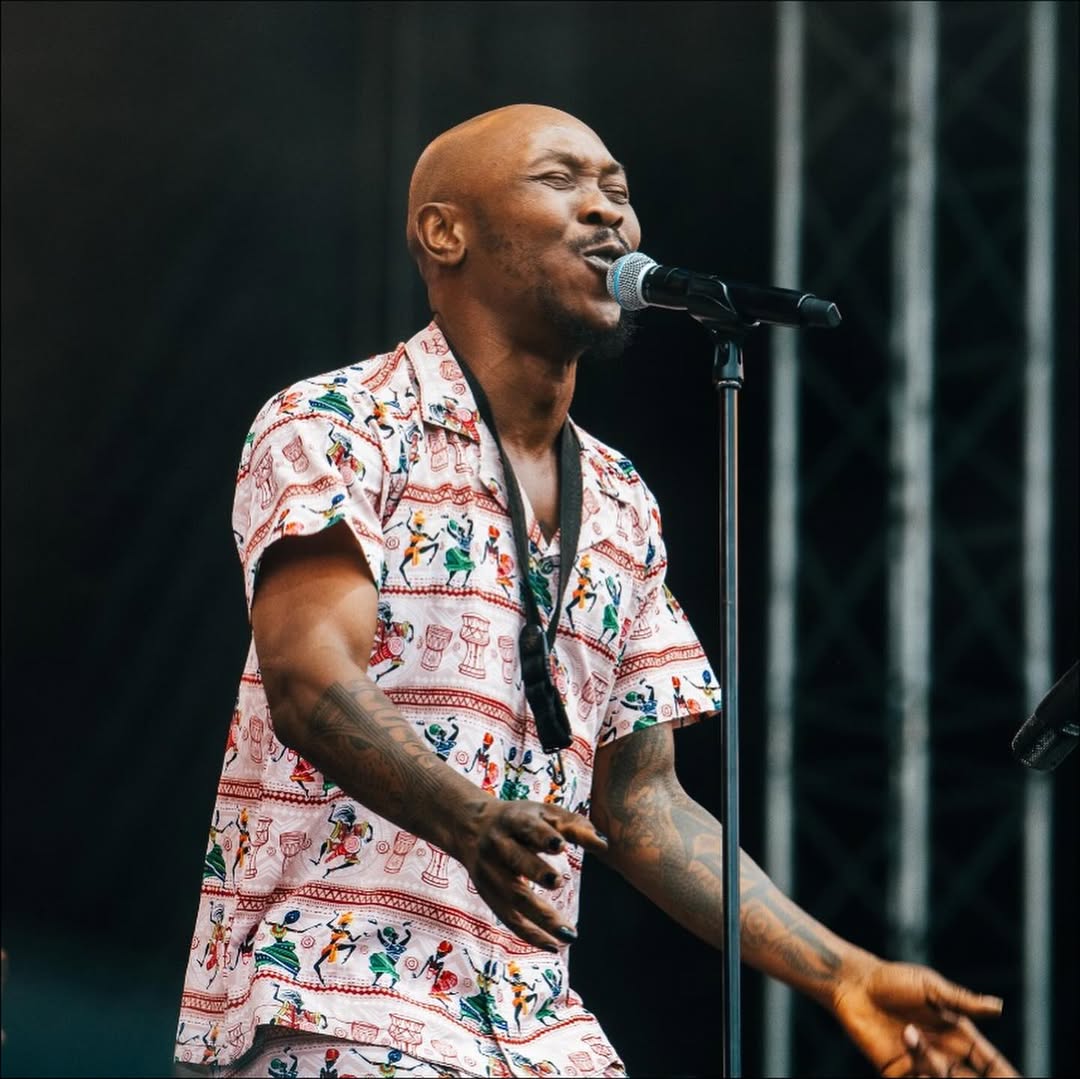
Some argue that “celebrity activism” risks being performative. How do you personally differentiate genuine advocacy from virtue signalling?
Well, I think virtue signalling is actually quite easy to spot. The proof is always in the pudding. People are not stupid; they can tell when someone is performing concern versus when someone is genuinely committed to a cause.
For me personally, I don’t even describe what I do as activism. I’m engaged in revolutionary work for liberation. Activism, in the way people use it today, is a completely different ballgame from revolutionary work. My music, my life, my relationships, the organisations I build with, and the way I spend my time. Everything is aligned toward achieving something real for my people and for my community. It’s not a hobby, it’s not branding, it’s not a phase. It’s the centre of my life.
So, virtue signalling is virtue signalling. Anyone doing it is easy to identify as such. And honestly, I don’t even mind if someone wants to virtue-signal for the betterment of Africa. If everybody were pretending to care about Africa, we might be farther along than it is today. But that’s not even the reality. Many people are not signalling anything positive for Africa. Some are even publicly advocating for foreign powers, like America, to invade our country, convincing themselves that such a thing would somehow be “good” for us.
In a time when silence can be political, do you ever feel pressure to comment on every crisis or injustice?
I actually don’t comment on everything. People might assume I do because of how strongly I speak when I choose to, but if you look closely at my YouTube, my Instagram, my public statements, I address very few of the things happening day‑to‑day. I pick what I talk about from an almost evangelical point of view: based on the message I believe I’m supposed to deliver to my people at that moment.
If I wanted to speak on every trending issue, or call out individuals, or respond to every scandal, my following would probably be much bigger. People enjoy that kind of thing; the gossip, the back‑and‑forth, the calling out of personalities. But that’s not my mission. I’m not interested in individuals; I’m interested in exposing the system that produces and empowers those individuals.
Because, in truth, many people don’t mind when a person is exposed. In fact, they enjoy it. They like seeing one individual fall so they can position themselves to replace them — all while protecting and defending the same system that created the problem in the first place. That’s why those who challenge the system itself, those who want to overturn it entirely, are painted negatively. We’re distorted, vilified, or dismissed because we’re not just pointing fingers at people; we’re pointing at the machine.
So, for me, the pressure isn’t to comment on everything. The responsibility is to use my platforms for real emancipation work, to say the things that matter, when they matter, for the liberation of our people.
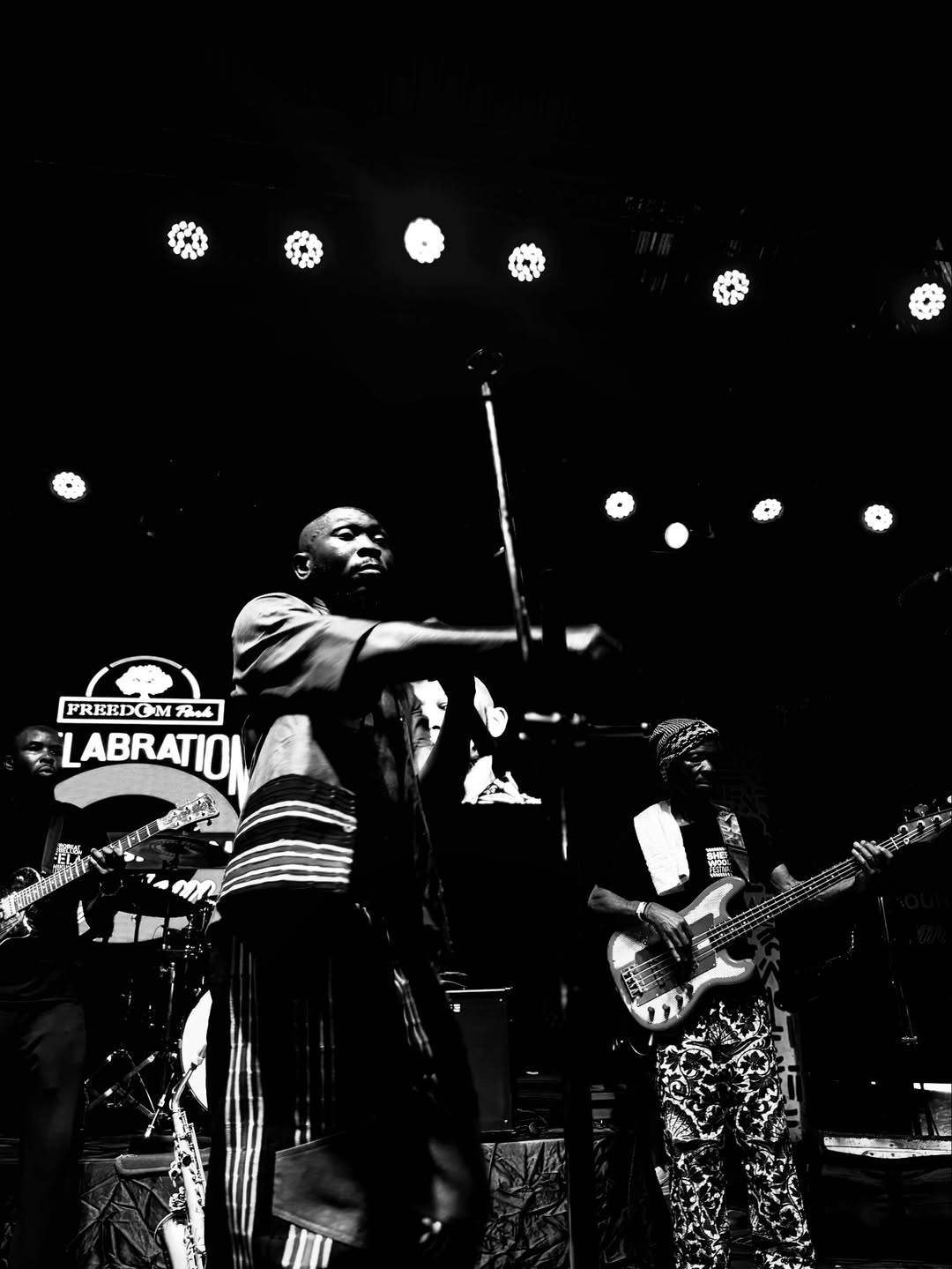
Your album, Heavier Yet (Lays The Crownless Head), executively produced by Lenny Kravitz, is stacked with some of the finest features, including Damian Marley, Sampa the Great, Don Letts, Gaudi, De La Soul, Adi Oasis, Kamasi Washington. What do you look for when selecting collaborators for your projects?
Let me just tell you the truth; it’s mostly my friends I call. I think, “Who is my friend I can call, and they won’t say no?” I don’t want stress in my life, so that’s always my first consideration. With some of the bigger collaborators on my projects, like Carlos Santana or Lenny Kravitz, it came from a different place.
With Carlos, for example, I knew he liked my work. He even wrote about me in his autobiography and talked about my music. That gave me the confidence to reach out. Carlos was my biggest feature on Black Times, simply because I knew the respect and admiration were already there.
With Lenny Kravitz, it was through Instagram. I noticed he was following me on Instagram before I even followed him. Little things like that, small signals that someone is aware of your work and resonates with it, matter a lot to me. They show that there’s mutual respect and understanding before any collaboration even begins.
Most recently, you teamed up with Vector on BIGBIRD & THA VIPER. You’ve worked with Vector on a couple of songs before, but how did the decision to work with Vector on a project come about?
Vector and I have always collaborated in different ways over the years. This EP is actually something we finished recording back in 2023–2024. Everything was done — the record, the video — everything. The only thing was that the record label delayed the release until now. Vector also had some obligations of his own, so we just had to wait.
One of the bases of our friendship has always been making music together. When we made this project, we wanted to show our relationship, our friendship, our lifestyle together. Like I said in an interview, it’s either you see the project as serious guys being funny, or funny guys being serious. Either way, that’s just how it is.
Recently, Fela Kuti: Afrobeat Rebellion opened, and even had you performing on the opening night. Why was it important as a member of the Kuti family for the exhibition to be showcased?
Because Fela is the greatest man, dead or alive. Superman has nothing on him. Batman dey play. Spider-man? We go slap am. E nor go better for Thor. Wakanda for where? Who be Black Panther? Because my dad is the greatest motherfucker that ever lived.
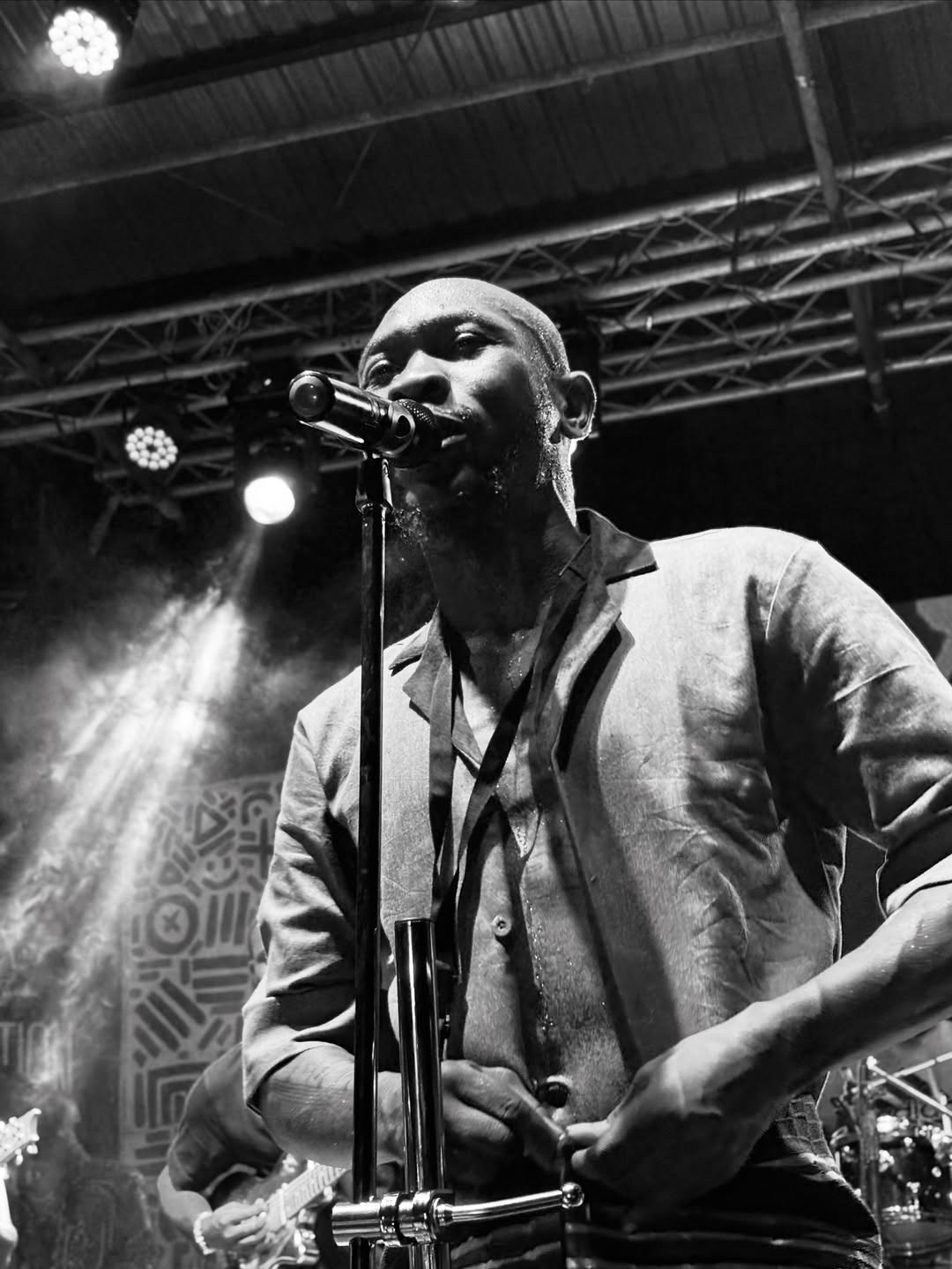
You’ve always been compared to your father, Fela. At what point did you stop feeling like you were walking in his shadow and start walking entirely in your own light?
People keep talking about “walking in my father’s shadow”, but you know, nobody really understands the intricacies, the dynamics, the life that made him who he was, and that shapes me, too. What’s wrong with being in that shadow? Honestly, it’s a great place; there’s shade, and the sun doesn’t burn you if you’re in it. Life feels soft and cool. I don’t mind that at all.
The truth is, my father raised us to be individuals, always being conditioned to find our own place in the world. And for better or worse, I believe my place in the world is very close to his. That’s just how it is. I want to play music, I want African people to be free — that’s where my spirit has led me, that’s where my understanding of self has led me. Who am I to question that?
Finally, if viewers were to take away just one thing from Bird’s Eye View, what would you want it to be?
There’s always an African side to the story or the solution to the problem that has not been considered. In our day-to-day engagement, in the way situations are analysed, we as African people often don’t include our own reality, our own perspective.
I wanted Bird’s Eye View to be a platform that ignites that spark in our people, that encourages them to think critically about the institutions and systems they encounter, to question what is presented to them, but always from an African lens. To see the world, the issues, the solutions — not just through someone else’s eyes, but through our own.
Emmanuel ‘Waziri’ Okoro is a content writer and journo with an insatiable knack for music and pop culture, with bylines on Afrocritik, PM News Nigeria, Tribune, ThisDay Live, Vanguard, and The Guardian. When he’s not writing, you will find him arguing why Arsenal FC is the best football club in the multiverse. Connect with him on Twitter, Instagram, and Threads: @BughiLorde.


